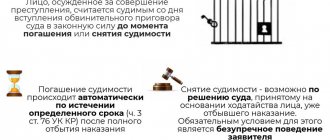1. The trial of a criminal case is carried out with the mandatory participation of the defendant, with the exception of cases provided for in parts four and five of this article.
2. If the defendant fails to appear, the consideration of the criminal case must be postponed.
3. The court has the right to bring a defendant who fails to appear without good reason, as well as apply or change a preventive measure against him.
4. A trial in the absence of the defendant may be allowed if, in a criminal case involving a crime of minor or medium gravity, the defendant requests that the criminal case be considered in his absence.
5. In exceptional cases, judicial proceedings in criminal cases of grave and especially grave crimes may be conducted in the absence of a defendant who is located outside the territory of the Russian Federation and (or) avoids appearing in court, if this person has not been brought to justice in the territory of a foreign state in this criminal case.
6. The participation of a defense attorney in court proceedings conducted in accordance with part five of this article is mandatory. A defense attorney is invited by the defendant. The defendant has the right to invite several defense attorneys. In the absence of a defense attorney invited by the defendant, the court takes measures to appoint a defense attorney.
7. If the circumstances specified in part five of this article are eliminated, the sentence or ruling of the court, passed in absentia, at the request of the convicted person or his defense attorney, is canceled in the manner prescribed by Chapter 48 of this Code. The trial in this case is carried out in the usual manner.
Good reasons
A citizen can skip a court hearing only if there is a good reason. Judges are people too and understand that in everyday routine various force majeure situations may arise due to which a person cannot come to a meeting. But the citizen must confirm the validity of his absence with official documents, otherwise a fine may be imposed for failure to appear in court.
Official valid reasons include:
- Death of a relative.
- The citizen received the summons either late or not. For example, in criminal proceedings, participants in the process are notified 5 days before the date of the hearing.
- Illness of a participant in the process or his relatives. A certificate will be required for confirmation.
- The citizen was not in the city, region or country. If necessary, the trial is postponed or the proceedings take place in the absence of the participant.
- Force majeure situations such as flooding, gas leaks or fire in an apartment/house, etc.
The court accepts these reasons as valid reasons and does not punish for absence from court. But citizens often behave like children, coming up with excuses like I forgot or was working, didn’t have money to come, etc. But work is not a reason for failing to appear at a court hearing. By law, the employer is obliged to release the subordinate. And confirmation is a summons with date and time.
Consequences of failure to appear in court in a civil case
If the plaintiff fails to appear at the civil hearing, his claim will be dismissed. If the defendant fails to appear, the case will be considered without him, and the decision will be made in absentia. This requires compliance with the following conditions:
- the defendant was duly notified of the date and time of the court hearing;
- the participant in the process did not report the reasons for his absence;
- the defendant misses the hearing again;
- The plaintiff does not object to the default judgment.
To appeal a court ruling in absentia, the defendant should be guided by Article 237 of the Code of Civil Procedure of the Russian Federation. An application to cancel a decision must be submitted within 7 days after receiving a copy of the document.
How to notify the court
If you really need to participate in the process, but it is not possible, then you should notify the court of your absence. You can do this in two ways:
- submit a petition to have the case considered without you;
- request that the meeting be adjourned.
The petition is made in writing. It is sent by email to the court or delivered in person to the court. When sending by email, it is recommended to call and check whether your application has been received.
If a citizen fails to appear at a hearing twice or more, the judge may consider the proceedings in your absence, questioning the validity of the absence. This is usually how cases of divorce or administrative violations are resolved.
With criminal trials the situation is much more complicated. Here, too, cases are sometimes considered in the absence of the defendant, but more compelling reasons are needed for this.
In writ proceedings, debtors are not notified at all, and all orders are issued without them. This is completely legal. Therefore, there is no need to swear when your account is suddenly frozen. The court orders such debts to be collected without the participation of the parties.
Nuances
The last word of the defendant, a sample text of which we have provided above, is not the responsibility of the defendant. Therefore, he himself must decide whether he will say something after the debate between the parties or will refrain from speaking.
Most often, defendants use their last word to further argue their case. However, we should not forget that the final speech of the accused is not evidence. Therefore, the court does not always perceive what an agitated defendant says. However, the latter cannot be interrupted or stopped.
Consequences
Many citizens are extremely irresponsible about such issues, not suspecting that they can be punished for failure to appear. The consequences of failure to appear are determined by the nature of the process and the role of the person absent in it. Usually, defendants deliberately skip court because they want to delay the proceedings.
In civil proceedings it is simpler, where the trial can take place without a defendant. But in criminal proceedings, even witnesses face liability for failure to appear. For such neglect, the court may impose a penalty of 2.5 thousand rubles. Although in practice such sanctions are rarely used.
The victim did not appear in criminal proceedings
The victim is required to appear at each meeting, since various procedural situations are resolved with his participation, such as the nature of the consideration in a special or general manner, the possibility of reconciliation between the victim and the accused, etc. The victim is notified in advance of the date and time, and he is required to appear at the meeting.
But in practice, victims are often absent from the courtroom. For example, if this is a disabled person, or a person after a stroke. It is difficult for such citizens to take part in the meeting, so they are questioned by bailiffs at home.
Failure of an accused to appear in a criminal case
The central figure in criminal proceedings is the accused in the case. He must be present at the trial. But in exceptional cases, the Code of Criminal Procedure allows the absence of the defendant when it is impossible to bring him to court. In other cases, if the accused fails to appear twice, the judge orders a forced arrest. It happens like this:
- The court issues a decision to bring the citizen. The bailiffs must complete this task. It is they who receive the resolution for signature.
- The bailiffs begin searching for the defendant, go to the address, make calls, trying in every possible way to establish the whereabouts of the citizen.
- If the defendant does not inspire confidence, then the bailiffs bring him to court on their own forcibly.
- If it is not possible to determine where the defendant is, then the bailiffs draw up a report where they report on the work done.
If the defendant cannot be found after several forced arrests, the court decides to put him on the wanted list. When the accused is found, he will be taken into custody for a period determined by the judge.
Witness in criminal proceedings did not show up
The witness is not a key participant in the process. Typically, witness statements are always attached to the case, so the court can always get acquainted with them. They can simply be read out in court. If the proceedings take place in a special order, then no witnesses are called at all.
If necessary, the defense or prosecution may request to call specific witnesses. The final decision to call or not to call rests with the judge. If the witness left his region (works on shifts, serves, etc.), then he will not be forcibly brought to the courtroom.
There is no plaintiff in a civil case
In civil proceedings the situation is simpler. Here the judge can consider the case in the absence of the plaintiff. The main thing here is that there is a statement of claim from the plaintiff. In it, the applicant has the right to request that the consideration take place without his presence.
If the defendant presents new evidentiary materials that change the essence of the proceedings under consideration, then the presence of the plaintiff will be required.
The defendant did not come
If the defendant does not appear at the hearing, then in civil cases the judge can make a decision without him. The main thing is to follow the procedure:
- Notify the defendant by SMS notification, call, summons.
- Send a statement of claim (copy) so that the person has an idea of what they want from him.
- Even before the trial, the claim is sent to the defendant.
Often, defendants do not appear in court, losing the opportunity to exercise their civil rights. For example, a defendant in a divorce case may ask the court to allocate a 3-month period for reconciliation. This is a good opportunity for spouses to reconcile and save the family.
Failure to appear in case of an administrative offense
Often, cases are considered by an administrative violation court without victims, where the culprit signs a protocol agreeing with the violation charged to him. This often happens to drivers when they refuse a medical examination or drive drunk.
This year, failure to appear at a meeting in an administrative or civil case will result in a fine of 1 thousand rubles.
What sentence does the accused face if he fails to appear at trial twice?
My boyfriend has Article 111, Part 2, paragraph 3. He has no previous convictions. What sentence does he face, and he failed to show up for trial a couple of times?
Hello, Ksenia! If your boyfriend is under investigation or is a defendant and is at large, it means that a preventive measure was chosen against him not related to isolation from society (that is, not detention), but, most likely, a written undertaking not to leave the place and proper behavior or House arrest.
According to Part 1 of Article 110 of the Code of Criminal Procedure of the Russian Federation
1. A preventive measure is canceled when it is no longer necessary, or changed to a stricter or more lenient one when the grounds for choosing a preventive measure, provided for in Articles 97 and 99 of this Code, change.
According to Art. 97 Code of Criminal Procedure of the Russian Federation
1. The inquirer, investigator, as well as the court, within the powers granted to them, have the right to choose for the accused, suspect one of the preventive measures provided for by this Code, if there are sufficient grounds to believe that the accused, suspect: 1) will hide from the inquiry, preliminary investigation or trial;
2) may continue to engage in criminal activity; 3) may threaten a witness, other participants in criminal proceedings, destroy evidence or otherwise obstruct the proceedings in a criminal case.
Thus, if your young man evades being summoned to court, he is accordingly violating the terms of the previously chosen preventive measure, and the court has every reason to take your young man into custody, since the sanction of Part 2 of Article 111 of the Criminal Code of the Russian Federation provides for punishment of up to 12 years in prison, which is classified as a particularly serious crime.
If you need more detailed advice, you can contact me in a personal chat.
Source
conclusions
Attendance at court hearings is a duty, not a right, of citizens. Therefore, such a requirement cannot be neglected, otherwise you will face liability:
- the law strictly regulates what will follow for failure to appear in specific situations;
- under favorable circumstances in civil or administrative proceedings, the judge may consider the case without the absentee;
- in criminal proceedings, the “truant” may be fined or brought to a meeting forcibly.
If it is not possible to participate in the process, it is better to notify the court about this in advance. Perhaps the case will be considered without the subject, or the hearing will be postponed to a more convenient time.
Legal advice
It is good if a person who finds himself in the dock has his own reliable defender, with whom he can discuss the details of his speech at the court hearing, which he will deliver after the completion of the debate between the parties.
After all, a good lawyer will always help his client in drafting the necessary text, even preparing a speech for him himself. In some cases, defenders provide the principal with a ready-made sample of the last word. The defendant only selects the right words and speaks at the hearing.
If a citizen refuses the services of a lawyer, then he will have to prepare a speech himself. In this case, lawyers advise taking your time and correctly stating your position, first on paper, and then in the process. If a person does not consider himself guilty, then he is obliged to say so in the last word, and also to support the information presented with arguments. He can also ask the court to impose a fair sentence.
Conduct of the defendant under the Code of Criminal Procedure of the Russian Federation
This code contains a number of articles that define the rights and obligations of the defendant. From the very beginning of the case in court, it is necessary to correctly build your defense.
The basic rights of the defendant include:
- Get information about the charge.
- Give evidence in the case.
- Object to the accusation.
- Provide evidence to the court.
- Submit motions and challenges.
- Get acquainted with the case materials.
- Take part in all court hearings.
- Appeal court verdicts.
The legislation of the Russian Federation ensures the right of a defendant to receive free assistance from a lawyer.
But if desired, instead of a public defender, the defendant can hire lawyers at his own expense, and also defend himself. The latter option is suitable only for those who have knowledge of law and appropriate qualifications.
The Constitution of the Russian Federation in Article 51 guarantees the right of a defendant to refuse to testify against himself and his family. In the defense line, such a right can be a very important way to hide information that could harm the defendant.









